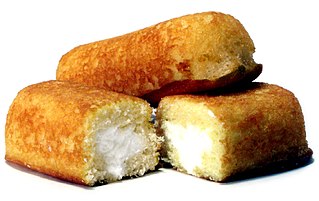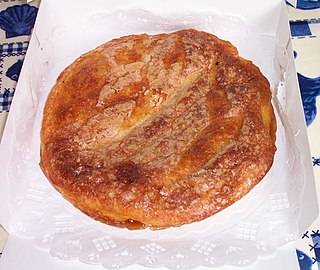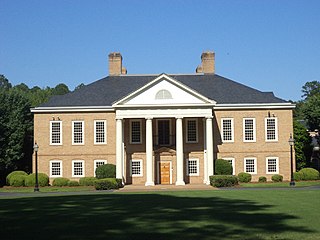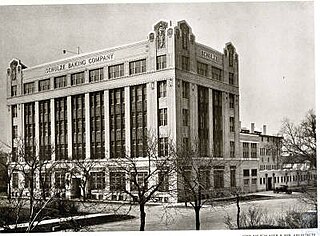Related Research Articles

Cake is a flour confection made from flour, sugar, and other ingredients and is usually baked. In their oldest forms, cakes were modifications of bread, but cakes now cover a wide range of preparations that can be simple or elaborate and which share features with desserts such as pastries, meringues, custards, and pies.

Pastry refers to a variety of doughs, as well as the sweet and savoury baked goods made from them. These goods are often called pastries as a synecdoche, and the dough may be accordingly called pastry dough for clarity. Sweetened pastries are often described as bakers' confectionery. Common pastry dishes include pies, tarts, quiches, croissants, and pasties.

A Twinkie is an American snack cake, described as "golden sponge cake with a creamy filling". It was formerly made and distributed by Hostess Brands. The brand is currently owned by Hostess Brands, Inc., itself currently owned by The J.M. Smucker Company and having been formerly owned by private equity firms Apollo Global Management and C. Dean Metropoulos and Company as the second incarnation of Hostess Brands. During bankruptcy proceedings, Twinkie production was suspended on November 15, 2012, and resumed after an absence of a few months from American store shelves, becoming available again nationwide on July 15, 2013.

Old HB, Inc., known as Hostess Brands from 2009 to 2013 and established in 1930 as Interstate Bakeries Corporation, was a wholesale baker and distributor of bakery products in the United States. Before its 2012 closure and liquidation, it owned the Hostess, Wonder Bread, Nature's Pride, Dolly Madison, Butternut Breads, and Drake's brands.

A bakery is an establishment that produces and sells flour-based baked goods made in an oven such as bread, cookies, cakes, doughnuts, bagels, pastries, and pies. Some retail bakeries are also categorized as cafés, serving coffee and tea to customers who wish to consume the baked goods on the premises. In some countries, a distinction is made between bakeries, which primarily sell breads, and pâtisseries, which primarily sell sweet baked goods.

Wonder Bread is an American brand of sliced bread. Established in Indianapolis, Indiana, in 1921, it was one of the first companies to sell sliced bread nationwide by 1930. The brand is currently owned by Flowers Foods in the United States.

Gooey butter cake is a type of cake traditionally made in St. Louis, Missouri. It is a flat and dense cake made with wheat cake flour, butter, sugar, and eggs, typically near an inch tall, and dusted with powdered sugar. While sweet and rich, it is somewhat firm, and is able to be cut into pieces similarly to a brownie. Gooey butter cake is generally served as a type of coffee cake and not as a formal dessert cake. There are two distinct variants of the cake: the original St. Louis, MO Bakers' gooey butter and a cream cheese and commercial yellow cake mix variant. The original St. Louis, MO Bakers' gooey butter is believed to have originated in the 1930s. It was made with a yeast-raised sweet dough on the bottom.

Kouign-amann is a sweet Breton bread made with laminated dough. It is a round multi-layered pastry, originally made with bread dough, containing layers of butter and incorporated sugar, similar in fashion to puff pastry albeit with fewer layers. It is slowly baked until the sugar caramelizes and the butter expands the dough, resulting in its layered structure. A smaller version, kouignette, is similar to a muffin-shaped, caramelized croissant.

Quick bread is any bread leavened with a chemical leavening agent rather than a biological one like yeast or sourdough starter. An advantage of quick breads is their ability to be prepared quickly and reliably, without requiring the time-consuming skilled labor and the climate control needed for traditional yeast breads.

Entenmann's is an American company that manufactures baked goods and delivers them throughout the United States to supermarkets and other retailers for public sales. Often, they are known to have display cases at the end of store aisles. The company offers dessert, cup, loaf, and crumb cakes, and donuts, cookies, pies, cereal bars, muffins, Danish pastries, and among other baked goods, buns. In the past several years, they have added designer coffee flavors along with scented candles to their product line in an effort to broaden its appeal.

Vienna bread is a type of bread that is produced from a process developed in Vienna, Austria, in the 19th century. The Vienna process used high milling of Hungarian grain, and cereal press-yeast for leavening.

Flowers Foods, headquartered in Thomasville, Georgia, is a producer and marketer of packed bakery food. The company operates 47 bakeries producing bread, buns, rolls, snack cakes, pastries, and tortillas. Flowers Foods' products are sold regionally through a direct store delivery network that encompasses the East, South, Southwest, West, and the Northwest regions of the United States and are delivered nationwide to retailer's warehouses. It has made acquisitions of a number of bakeries and other food companies over the years, continuing through to the present day. As of February 2013, it had grown to be the "second-largest baking company in the United States".

Schulze Baking Company Plant is a factory building located on the South Side of Chicago, Illinois, United States. It is located at 40 East Garfield Boulevard in the Washington Park community area in Cook County. Built in 1914, the building was listed on the National Register of Historic Places on November 12, 1982. Originally built for the Schulze Baking Company, it was the home of the Hostess Brands' Butternut Bread until 2004.

Bimbo Bakeries USA, Inc. is the American corporate arm of the Mexican multinational bakery product manufacturing company Grupo Bimbo. It is the largest bakery company in the United States. The subsidiary, headquartered in Horsham, Pennsylvania, a suburb of Philadelphia, owns many fresh bread and sweet baked goods brands in the United States, including Arnold, Levy's, Ball Park, Columbo, Francisco, Oroweat, Entenmann's, Sara Lee, and Thomas'. It is also a top advertising sponsor for many major soccer teams around the globe.

Sprinkles Cupcakes is a bakery chain established in 2005. It is considered the world's first cupcake bakery.
The history of California bread as a prominent factor in the field of bread baking dates from the days of the California Gold Rush around 1849, encompassing the development of sourdough bread in San Francisco. It includes the rise of artisan bakeries in the 1980s, which strongly influenced what has been called the "Bread Revolution".

The Continental Baking Company was one of the first bakeries to introduce fortified bread. It was the maker of the Twinkie and Wonder Bread. Through a series of acquisitions and mergers it became part of the former Hostess Brands company.
Colombo Baking Company was a bakery founded in 1896, known for its sourdough bread. Located at 580 Julie Ann Way in Oakland, California, it became a wholly owned division of Hostess Brands. Colombo sourdough rolls were manufactured at a satellite bakery in Sacramento, California. Along with Toscana bakery of Oakland and Parisian bakery of San Francisco, Colombo became part of the San Francisco French Bread Company (SFFBC) which was acquired by Hostess in 1994. The brands competed locally in the San Francisco Bay Area. As a result of Hostess liquidating the company, Colombo shuttered its operation in November, 2012. The SFFBC, through Colombo's bakery, was the maker of Emperor Norton San Francisco Sourdough Snacks, which ceased production in 2012, prior to the Hostess liquidation.

Hostess Cake, mostly known simply as Hostess, is a brand under which snack cakes are sold by Hostess Brands. The brand originated in 1919 when the first Hostess CupCake was sold. However, it is better-known as the brand under which Twinkies are sold, after that product appeared in 1930.

Mexican breads and other baked goods are the result of centuries of experimentation and the blending of influence from various European baking traditions. Wheat, and bread baked from it, was introduced by the Spanish at the time of the Conquest. The French influence in Mexican Bread is the strongest. From the bolillo evolving from a French baguette to the concha branching out from a French brioche even the terminology comes from France. A baño maría, meaning a water bath for a custard type budín or bread pudding comes from the French word bain marie. While the consumption of wheat has never surpassed that of corn in the country, wheat is still a staple food and an important part of everyday and special rituals. While Mexico has adopted various bread styles from Europe and the United States, most of the hundreds of varieties of breads made in the country were developed here. However, there is little to no baking done in Mexican homes; instead, Mexicans have bought their baked goods from bakeries since the colonial period.
References
- ↑ "Bakery's Anniversary Ball Attended by 7000" . Retrieved 23 December 2014.San Diego Union — Oct 24, 1932 (Subscription required.)
- ↑ "Founders of Cramer's Bakery Delivered First 55 Loaves of Bread to Customers in a Basket" . Retrieved 23 December 2014.The Evening Tribune — Dec 6, 1938 (Subscription required.)
- ↑ "$26,300 Bakery Permit Issues at City Hall" . Retrieved 23 December 2014.San Diego Union — Feb 8, 1938 (Subscription required.)
- ↑ "Cramer's Bakery 40 Years Old" Archived 2014-11-09 at the Wayback Machine San Diego Union — Oct 21, 1932
- ↑ "Bread & Salt: Artists enclave " San Diego Union Tribune — Feb 8, 2013